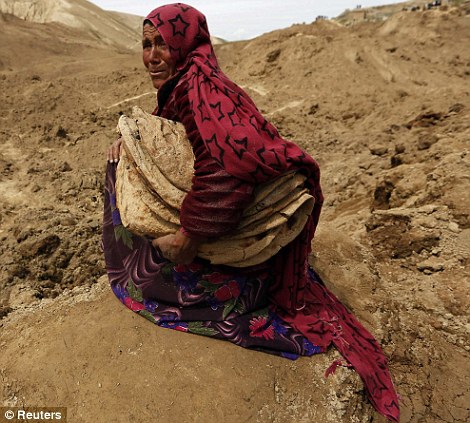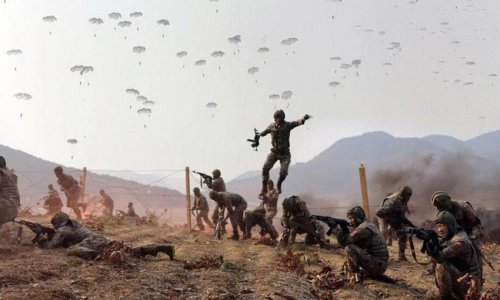Follow us !
Wiped out by the landslide - PHOTO
World
23:00 | 05.05.2014

Wiped out by the landslide - PHOTO
Devastated survivors have spoken of the moment their Afghan village was obliterated by a deadly landslide, which has killed as many as 2,500 people.The disaster, which struck on Friday morning, buried Aab Barik, in north east Afghanistan, under tonnes of rock and mud. It destroyed hundreds of homes and displaced as many as 4,100 people, who are now living in tents provided by aid agencies.Bibi Khanum, 55, lost her husband and four children in the devastation. She said: 'Our house was totally destroyed, we are destroyed and our life is destroyed.'My husband was killed under the rubble and four of my young children. I am going crazy without them, repeating their names time and time again.'Aid groups were today rushing to reach survivors as government officials said the current death toll was at least 300 and warned it could rise by hundreds more, after initial reports suggested that as many as 2,500 people may have died.Large crowds gathered at the remote disaster site, where rescue efforts were abandoned due to the volume of deep mud covering houses.Only a few dead bodies have been pulled from the debris.'Around 1,000 families are thought to have been affected with some 300 houses totally destroyed,' the United Nations Office for the Coordination of Humanitarian Affairs said in a statement.'Assessments to determine priorities on immediate child protection and water, sanitation, and hygiene needs for (displaced) families are continuing.'It added that 700 families were displaced, with many fleeing their homes in fear that the unstable hillside could unleash more deadly landslides.Tents, emergency food supplies, health services and support for children who lost parents were being organised after many survivors spent another night in the open.Wailing near her father's destroyed house, Begum Nisa, a 40-year-old mother of three, described the moment when the wall of mud smashed through the village.'I was eating lunch by the window of my house, then suddenly I heard a huge roar,' she said.'I shouted to my family to save themselves, but it was too late. I have lost my dear father and mother. I also lost my uncle and five members of his family.'Local people and emergency workers had used shovels to try to dig out anyone trapped alive but without success, and relief work turned to caring for survivors.Supplies began arriving as aid groups struggled to reach the village via poor mud roads that were unable to take heavy vehicles.Many villagers were at Friday prayers in two mosques when they were engulfed by the torrent of mud, and a second landslide hit people who assisted those in need.Afghanistan held a national day of mourning on Sunday after President Hamid Karzai expressed his condolences to those who had lost loved ones.'We have a list of around 300 people confirmed dead,' Badakhshan governor Shah Waliullah Adeeb told reporters at the scene on Saturday.'We cannot continue the search and rescue operation anymore, as the houses are under metres of mud.'The harrowing account come as aid agencies attempt to restore basic amenities to the villagers. In a sign of the scale of devastation, the area is now being referred to a burial ground on account of the number of bodies trapped under the mud.Andrew Morris, chief of Unicef for the Northern Region of Afghanistan, said: 'The whole area has been declared a burial ground, our staff described it as in some places as deep as 50 metres of mud.'The whole side of the mountain collapsed. Initially, after the first landslide, men from the neighbouring villages all ran to help with search and rescue. But the landslide slid further and killed all of them as well. It has left a number of children without fathers, and that is an additional tragedy here.'Our first priority was to get water supplies going - people had just a few bottles of water handed out yesterday by visitors, the local government. At the same time we are urgently looking at sanitation.'Then we have to help children to overcome this traumatic event. We have got to get them back to school as soon as we can. That is part of the return to normalcy.'Badakhshan is a mountainous province in northeast Afghanistan bordering Tajikistan, China and Pakistan.The landslides follow recent severe flooding in other parts of northern Afghanistan, with 150 people dead and 67,000 people affected by floods in Jowzjan, Faryab and Sar-e-Pul provinces.Flooding and landslides often occur during the spring rainy season in northern Afghanistan, with flimsy mud houses offering little protection against rising water levels and torrents of mud.(dailymail.co.uk)BakuDaily.Az










